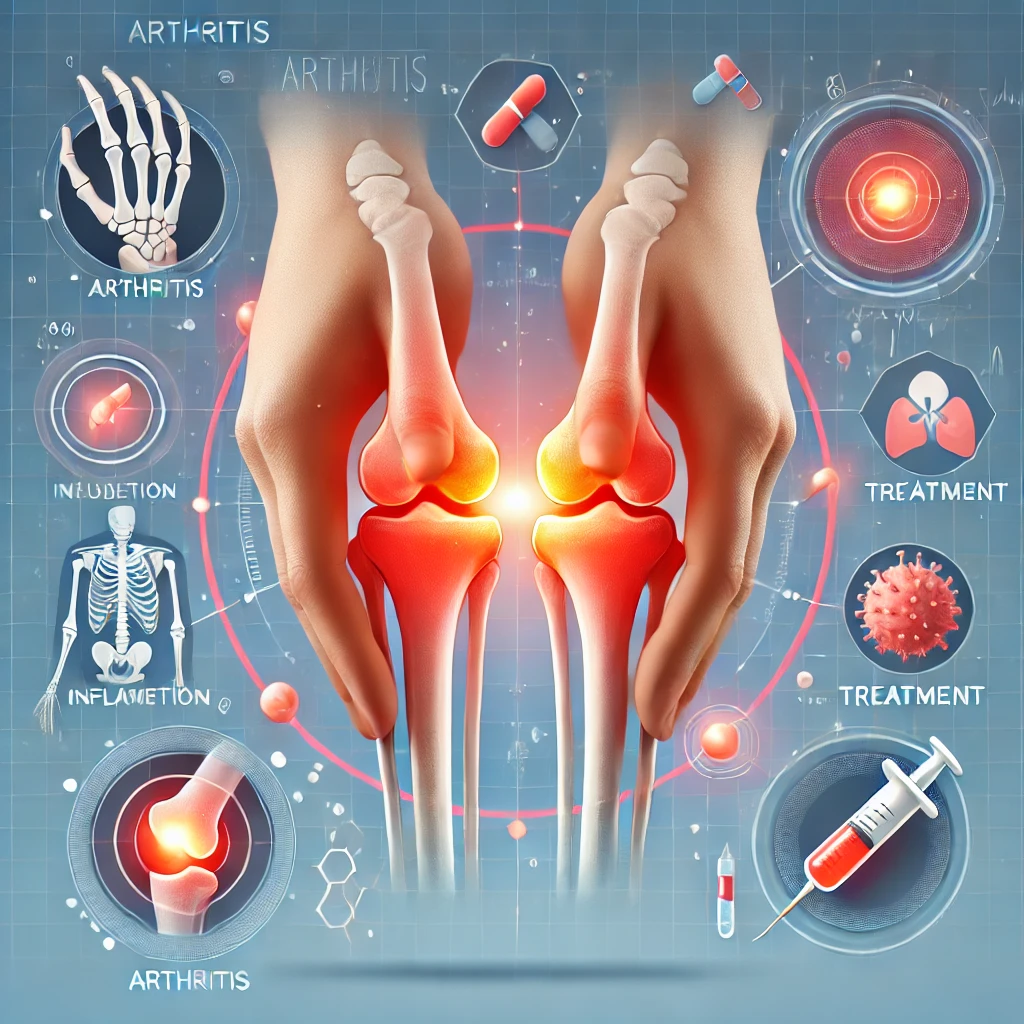Our Services
- Diabetes Mellitus
- Hypertension
- Osteoporosis
- Inflammatory Bowel Diseases
- Hypothyroidism and Endocrine Diseases
- Chronic Respiratory Diseases
- Chronic Neurological Diseases
- Chronic Liver Diseases
- Chronic Kidney Diseases
- Cardiovascular Diseases
- Arthritis and Rheumatic Diseases
- Confidential STD Testing & Treatment
- Women’s Health Screenings
- Men’s Health Screenings
- Obesity
- Vitamin Infusions
- Weight Management

Arthritis and Rheumatic Diseases
Arthritis and rheumatic diseases encompass a group of conditions that affect the joints, connective tissues, and immune system, leading to pain, stiffness, and inflammation. Common conditions include rheumatoid arthritis (RA), osteoarthritis (OA), and systemic lupus erythematosus (SLE).
At our clinic, we provide comprehensive follow-ups to reduce inflammation, relieve pain, and improve mobility, helping patients maintain an active and fulfilling lifestyle.
Types of Arthritis and Rheumatic Diseases
1. Rheumatoid Arthritis (RA)
- An autoimmune disorder that causes chronic inflammation in joints.
- Can lead to joint deformities and systemic organ involvement.
- Symptoms: Joint pain, swelling, morning stiffness, fatigue.
- Treatment: Disease-modifying anti-rheumatic drugs (DMARDs), biologics, pain management.
2. Osteoarthritis (OA)
- A degenerative joint disease due to cartilage breakdown over time.
- Risk factors: Aging, obesity, joint overuse, previous injuries.
- Symptoms: Joint pain, stiffness, reduced range of motion, bone spurs.
- Treatment: Pain relievers, physical therapy, joint injections, weight management.
3. Systemic Lupus Erythematosus (SLE)
- A chronic autoimmune disease that affects joints, skin, kidneys, and other organs.
- Symptoms: Joint pain, fatigue, skin rashes, organ inflammation.
- Treatment: Immunosuppressants, anti-inflammatory medications, corticosteroids.
4. Other Rheumatic Conditions
- Gout: A type of arthritis caused by uric acid buildup in joints.
- Ankylosing Spondylitis: A type of arthritis that mainly affects the spine.
- Psoriatic Arthritis: Inflammation of joints associated with psoriasis.
Symptoms of Arthritis and Rheumatic Diseases
Symptoms vary depending on the condition but commonly include:
- Joint pain and swelling.
- Morning stiffness lasting more than 30 minutes.
- Reduced flexibility and limited movement.
- Chronic fatigue and general discomfort.
- Skin rashes, fever, or organ complications (in autoimmune conditions).
Arthritis and Rheumatic Disease Management & Treatment
1. Early Diagnosis & Monitoring
- Blood tests (rheumatoid factor, anti-CCP, ANA).
- X-rays, MRI, or ultrasound to assess joint damage.
- Regular follow-ups to monitor disease progression.
2. Medication Therapy
- Nonsteroidal anti-inflammatory drugs (NSAIDs) – Reduce pain and inflammation.
- Corticosteroids – Control severe inflammation.
- DMARDs & Biologics – Slow disease progression in autoimmune arthritis.
- Pain management medications – Help relieve chronic discomfort.
3. Physical Therapy & Exercise
- Joint-friendly exercises (swimming, yoga, low-impact strength training).
- Physical therapy to improve mobility and muscle strength.
- Posture and ergonomic modifications to prevent strain.
4. Lifestyle & Dietary Modifications
- Maintain a healthy weight to reduce joint stress.
- Anti-inflammatory diet rich in omega-3s, whole grains, and leafy greens.
- Avoid excessive alcohol and processed foods to prevent inflammation.
5. Advanced Treatment Options
- Joint injections (steroid or hyaluronic acid).
- Surgery (joint replacement for severe osteoarthritis cases).
- Immune system modulation for autoimmune conditions.
Complications of Untreated Arthritis & Rheumatic Diseases
Without proper treatment, these conditions can lead to:
- Permanent joint damage & deformities.
- Severe mobility limitations & disability.
- Systemic complications affecting the heart, kidneys, or lungs.
- Chronic pain & reduced quality of life.
Advantage Rheumatic Care
We provide a comprehensive arthritis and rheumatic disease management program, including:
✅ Early detection & personalized treatment plans.
✅ Collaboration with rheumatologists for specialized care.
✅ Pain management strategies & mobility improvement.
✅ Physical therapy & rehabilitation support.
✅ Guidance on diet, lifestyle changes, and long-term joint health.


Health Tips & Info
- Stay active with low-impact exercises to maintain joint function.
- Follow an anti-inflammatory diet to support overall health.
- Monitor symptoms and seek medical advice for persistent joint pain.
- Use joint protection techniques to prevent excessive strain.
- Stay hydrated and maintain a healthy weight for joint support.